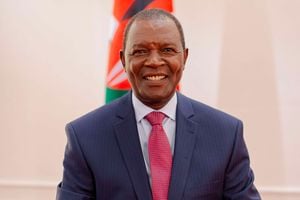
Members of the National Assembly during a sitting in June last year.
Parliament will rethink its expenditure plans in the next financial year after its budget was slashed by Sh21 billion as per the estimates approved by MPs on Tuesday evening.
The reduction, according to the recommendations of the Budget and Appropriations Committee, was to align parliament’s expenditure plans to the Budget Policy Statement (BPS) approved by the House in March.
The National Assembly and Senate had projected to spend Sh65.8 billion in the 2024/25 financial year that starts on July 1, 2024, in line with the estimates tabled on April 30.
However, a report by the committee chaired by Kiharu MP Ndindi Nyoro – upon considering the estimates of the Executive, Legislature and Judiciary – slashed the budget to Sh44.6 billion.
Once signed into law, the Appropriations Bill will give government agencies the legal mandate to expend the sums allocated as approved by the House.
“The gross total resource requirement for the 2024/25 financial year, which I now lay on the table of the National Assembly and request that it be considered and approved is Sh65.8 billion,” the document presented to the House on behalf of Speaker Moses Wetang’ula reads.
The Parliamentary Service Commission (PSC) had noted that the ambitious estimates were cast on the assumption that the BPS-approved ceiling of Sh43.6 billion would be adjusted upwards to accommodate the financing gap of Sh22 billion.
“It is observed that the legislative sector has made significant progress towards realising the national goals and objectives,” the document reads.
Enhance services
“Adequate resources for the sector will enhance services and effectiveness in the oversight and representation functions.”
The budget is, nonetheless, an increase compared to the Sh40.74 billion allocated in the current financial year.
Parliament has four votes – the PSC chaired by Mr Wetang’ula, Parliamentary Joint Services (PJS), the Senate and the National Assembly vote.
In the estimates presented to the House, the commission had proposed an allocation of Sh3.06 billion, National Assembly Sh32.49 billion, PJS Sh8.63 billion and Senate Sh14.42 billion.
However, the biggest casualties were the National Assembly and Senate, losing Sh6 billion, followed by the PSC with PJS’ budget shooting up.
The approved figures have PSC allocated Sh1.2 billion down from the proposed Sh3.06 billion, National Assembly Sh26.8 billion down from the proposed Sh32.49 billion and Senate a reduction of almost by half – Sh8 billion down from Sh14.42 billion.
The PJS allocation shot up by tens of millions of shillings – some Sh8.65 billion from the Sh8.63 billion as had been proposed in the estimates.
This means that parliament will have to undertake its expenditure plans for the next financial year based on the amount allocated by the National Assembly.
PSC had Sh1.8 billion chopped from the general administration planning and support services and Sh215.6 million from the human resources management and development.
Despite this reduction, PSC got an increase of Sh50 million for salary adjustments and an increase of Sh50 million for commission committees.
The National Assembly had Sh6.3 billion meant for national legislation, representation and oversight cut but had an increase of Sh44 million in recurrent expenditures for research services operations and training for the National Assembly.
It also had an increase of Sh310 million for salary adjustment for constituency offices and another increase of Sh193 million for salary adjustments of National Assembly staff.
Sh6.6 billion
The Senate had a reduction of Sh6.6 billion that includes Sh2.9 billion meant for legislation and oversight, Sh2.3 billion in terms of administration planning and support services and Sh1.4 billion for representation, liaison and intergovernmental relations.
Despite this, the Senate had Sh112 million salary adjustment for Senate staffers, Sh70 million increase for salary adjustment for county offices, Sh30 million increase for research services operations and training Senate.
According to the Parliamentary Service, the key drivers that led to the tabling of estimates above the approved BPS ceiling include demand by the Kenya Revenue Authority (KRA) on Pay As You Earn (PAYE) on motor vehicle reimbursement of Sh1.5 billion.
“This continues to rise due to interest and penalties,” the Parliamentary Service document says.
There is the additional Sh2.5 billion capitation for MPs’ mortgage as well as staff, Sh2 billion for Senate oversight and Sh1.5 billion funding each for all House committees and development of Centre for Parliamentary Studies and Training (CPST).
Other key drivers include Sh1 billion for completion of the recently launched Bunge Tower and payment for final certificate, Sh1 billion for maintenance of the parliamentary square including acquisition of buildings.
There is also Sh800 million for “continuous” capacity building for MPs and staff of parliament.






